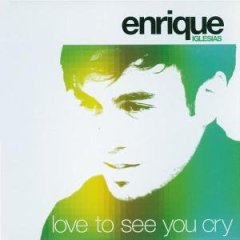| "Love to See You Cry" | ||||
|---|---|---|---|---|
 | ||||
| Single by Enrique Iglesias | ||||
| from the album Escape | ||||
| Released | 3 June 2002 | |||
| Length | 4:07 | |||
| Label | Interscope | |||
| Songwriters |
| |||
| Producer | Mark Taylor | |||
| Enrique Iglesias singles chronology | ||||
| ||||
| Music video | ||||
| "Love to See You Cry" on YouTube | ||||
"Love to See You Cry" is the fourth single released from Spanish singer-songwriter Enrique Iglesias' second English-language studio album, Escape . The song was written by Iglesias, Mark Taylor, Paul Barry and Steve Torch, and it was produced by Taylor.
Contents
- Track listings
- Credits and personnel
- Charts
- Weekly charts
- Year-end charts
- Release history
- References
The single was released on 3 June 2002 in Europe and peaked at number 12 on the UK Singles Chart. Worldwide, the song reached number one in the Czech Republic and peaked inside the top 20 in Canada, France, Greece, Ireland, Portugal, Romania, and Spain. The music video features Mexican model Elsa Benitez playing opposite Iglesias.